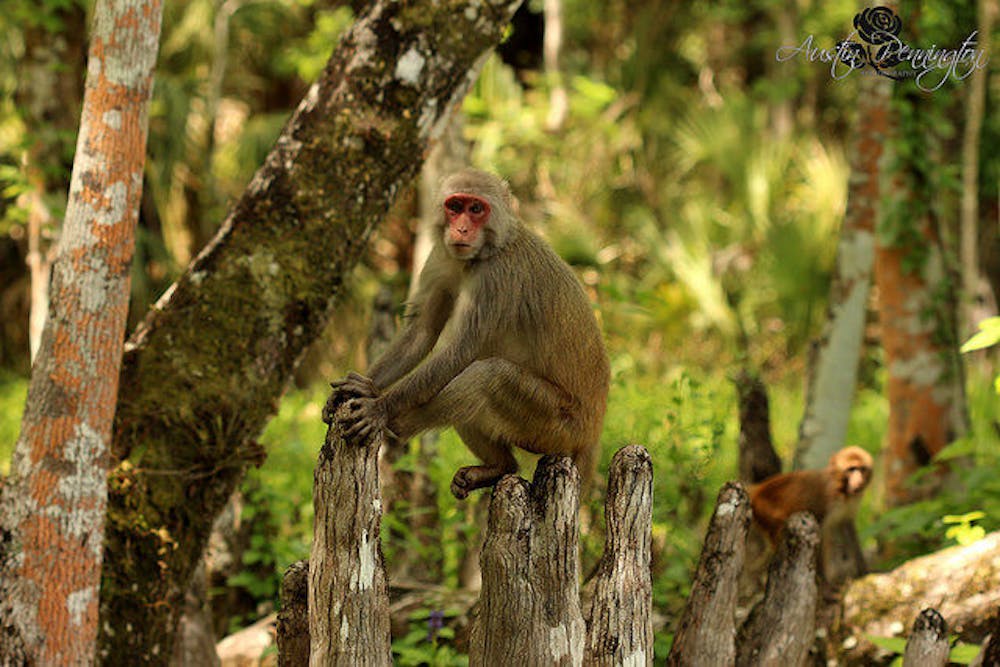The latest issue of National Geographic addresses something that has become near and dear to me since trenching through the depths of science journalism: the war on science, which seems unending.
To me, it boils down to one thing: misunderstanding. Today we’re still seeing oppositions to vaccination, questions on the reality of space flight, and most devastatingly the dissenters of climate change (come on, isn’t it better to preserve for the future rather than be gluttonous in the present?).
This war is no stranger to our backyard. Just an hour south of Gainesville, Silver Springs has been home to the cute and fuzzy rhesus macaque since the 1930s, when a guy named Colonel Tooey wanted to spice up his Jungle Cruise boat ride and stuck six macaques—native to a range spanning from Afghanistan to eastern China—on an island in Silver Springs (not knowing that they, in fact, can swim). Before long, the macaque population grew and they made Silver Springs their new home.
I've worked with a lot of researchers to help communicate their research to the public, and I had been in touch with the researcher at the center of this latest local controversy prior to this happening (I’m keeping their identity private because they have received many threats from animal rights groups). In short, the researcher wanted to study to what extent this invasive macaque species had an effect on the native Silver Springs flora and fauna.
They had placed a radio collar on a female macaque (they named her Khaleesi in reference to Game of Thrones) and had been tracking her for a few months before the collar began irritating the macaque’s neck. I’m not speaking for the researcher, but no researcher wants this to happen. Not only does this cause unintended effects on the subjects, but it means that all the hard work leading up to this moment must start over.
I’m all for saving any creature in danger. Yet we have to understand that responsible researchers today—especially this researcher—aren't like the ones from back in the day, the ones that abused their power and ultimately sparked the animal rights movement. Animal research helps us attain a deeper understanding and appreciation of these species, the world around us, and even can help humans. Important note: any UF research done using live animal subjects must get approval from the Institutional Animal Care and Use Committee, which is mandated by the Animal Welfare Act and the Health Research Extension Act.
Scientific research isn’t a one-and-done answer to the world’s problems. If this were the case, maybe Louis Pasteur would have developed the rabies vaccine on the first try, or Mendel would have fully understood alleles after the first batch of peas. Even research on macaques has helped us develop vaccinations for polio and smallpox—even the development of HIV/AIDS-managing drugs.
In research, we need multiple trials to form a pattern that we can base fact on. It takes time, and these trials don’t always go as planned, especially when dealing with the unpredictability of live subjects. In order to learn, we try again, (you didn’t know how to write on your first try, did you?), which can also mean we sacrifice.
Sacrifices come with conservation too. That seems backwards, right? It’s essentially the business of saving every being and every land. Researchers might work and work and work as hard as they can (not without trial and error) to make the conditions for one species so spectacular that it thrives! Hooray, right? Don’t start celebrating just yet. What about that species prey, which will have to deal with increased depredation? What about the microorganisms that cannot survive in this changed environment? And what about the humans whose only food source is now illegal to catch? It’s a chain, it’s a balance, it’s a sacrifice.
The war on science is embedded in emotion and quick judgments. “GMOs are terrible.” But why? “What do you mean ‘global warming’? This winter was actually colder this year.” There’s more than one facet to global warming effects. This is where communicators need to be better at teaching their audience and the audience must be willing to check something out before running with it. Maybe one day we can meet in the middle, shake each other’s hands, and the war will be over.






